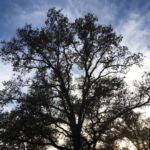
Today is the day after Christmas.
I have a fire burning in the woodstove. It is raining. The dog is asleep on the blue blanket on his favorite corner of the red couch.
Advent is over. Christmas Day is gone. We are back in a time that is after Christmas.
I confess that I am relieved. I feel a little bad about that.
I’ve talked a lot here these last weeks about the Advent devotional books I’ve been reading and the meaning of Advent. It’s a time of waiting. So much waiting. And what am I even waiting for? Such build up! And then there is a day, and it passes, and then it is the day after. We had a nice day yesterday. We opened presents. (I am grateful that we had presents. I know that many families did not this year.) I made an egg and sausage casserole for breakfast. It was just OK. Also, I cut up fresh strawberries and blueberries and fixed Mexican hot chocolate from chocolate grown in Mexico that I brought back from my trip. My son said the hot chocolate tasted like tea. That was not a compliment. He was happy with his Lego sets and immediately set out to building them. My daughter tried on her new jeans and even though they were exactly the same size and the same style from the same store, one pair fit and one didn’t.
The day came and went. I don’t feel any different. I guess I am still waiting, although for what exactly, I do not know.
On this day after Christmas I am still me: insecure, anxiety prone, sometimes a little sad, often wanting to control things that I cannot control. Which is basically everything.
Walter Brueggemann had a beautiful “Christmas Day” devotion in his Celebrating Abundance book. Of course, I didn’t read it yesterday when I was supposed to. I am reading it today, a day late.
Here is the first line: “Christmas is especially for those of us whose lives are scarred and hurt in debilitating ways. Of course that means all of us.”
I love that line. That is exceptionally good and comforting news. Also, it is a beautiful reminder for me that I am not alone in my flaws and wounds. Apparently, you have them, too. We all are fragile and broken, yearning for something at Christmas time and all times that somehow seems to continually elude us.
The rest of his Christmas day devotion examines this passage from Isaiah 43:
“Do not remember the former things, or consider the things of old. I am about to do a new thing; now it springs forth, do you not perceive it? I will make a way in the wilderness and rivers in the desert.” (Isaiah 43:18-19)
This word that comes to us at Christmas can be broken down into two simple parts, Brueggemann says: Do not remember former things, and “Behold, I am doing a new thing.”
He writes, “The reason that we may forget what is old and past is that it is being powerfully displaced by what is new and healing and liberating.”
This is how hope comes to us at Christmas, and the day after Christmas, and all the days that follow. Even today. Even this day.
So I can leave behind the two Sundays of Advent that I never wrote about here, even though I vowed to. I can forget the “good old days” (as Brueggemann calls them) because those days weren’t really as good as I am remembering them. This is especially relevant at Christmas, because my Christmases of long ago have started to take on a magical glow of perfection, those years when my parents were here and we were able to be together. I can also forget my past shame, guilt, hurts, the wrongs I have done to people I love, the wrongs they have done to me. I can, as Brueggemann writes, “stop and notice the newness that God is giving, that lets our life start over in a fresh place.”
What freshness could I hope for in these days after Christmas? What could I dream? What could any of us dream? How could this newness change me?
Not sure that I can answer these questions quite yet. But it’s something to think about on this day after Christmas.




No Comments